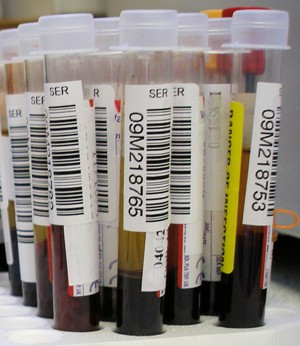Post Surgery Blood Test Can Predict Death From Heart Problems

Blood test after surgery can predict the death of patients from cardiac problems, according to a Washington University School of Medicine report.
An international team of scientists has found that the blood test taken after surgery can actually predict the death risk of a person from cardiac problems. They discovered this while measuring the levels of the heart protein troponin of more than 15,000 non-cardiac patients.
During the study, scientists had taken blood samples of 15,000 non-cardiac patients and checked for troponin levels. Among the 15,000 non-cardiac patients, 16.9 percent had high troponin levels.
Scientists claimed that increase in troponin levels causes cardiac problems ultimately leading to death within 30 days of surgery.
"After surgery, heart attack can be a catastrophic complication," said Peter Nagele, scientist at the Washington University, in a statement. "It's difficult to diagnose a heart attack following surgery because the pain medications patients receive often mask chest pain. This blood test may make it easier to identify patients at the highest risk of death."
Usually doctors measure troponin levels in cardiac patients, who have undergone surgery, but they do not check troponin levels in non-cardiac patients. Scientists claim that it is important to check these levels in non-cardiac patients also.
More than 200 million adults across the world have undergone major non-cardiac surgery every year. Among them, more than one million adults die within a month of their operation.
The study suggests that the test should become a standard part of post-operative care. This will probably help the doctors to detect the risk of getting heart problems in non-cardiac patients and this will in turn save many lives.
"Surgery is a major stress test. You are exposing someone to a major trauma, and those patients tend to be at a higher risk for heart attack. The presence of troponin in the blood represents a 'red flag' for potential problems during the first 30 days, and perhaps the first year following a major operation," Nagele says.
Scientists are now planning one more study on more than 40,000 non-cardiac patients. They claim that the further studies will help know more about the changes in troponin levels before and after surgery and this will help them to get more accurate results.
"Both tests measure the same proteins, but the new one has a higher degree of sensitivity," said Nagele. "Now we want to know whether we can measure changes in troponin levels before and after surgery."
© Copyright IBTimes 2025. All rights reserved.



















